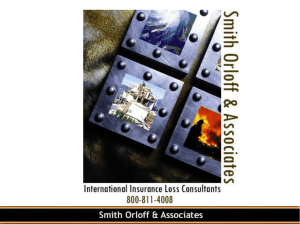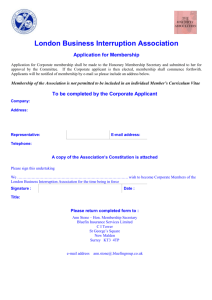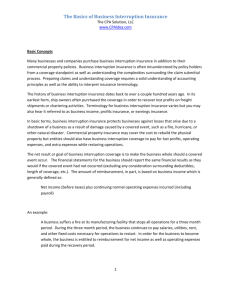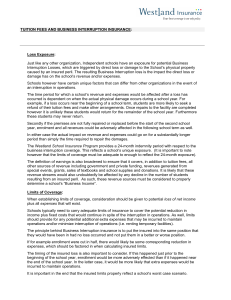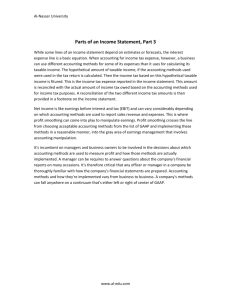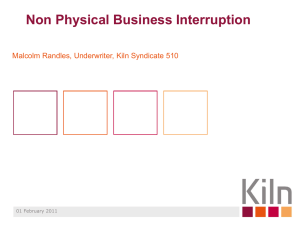Documenting Business Interruption Claims
advertisement
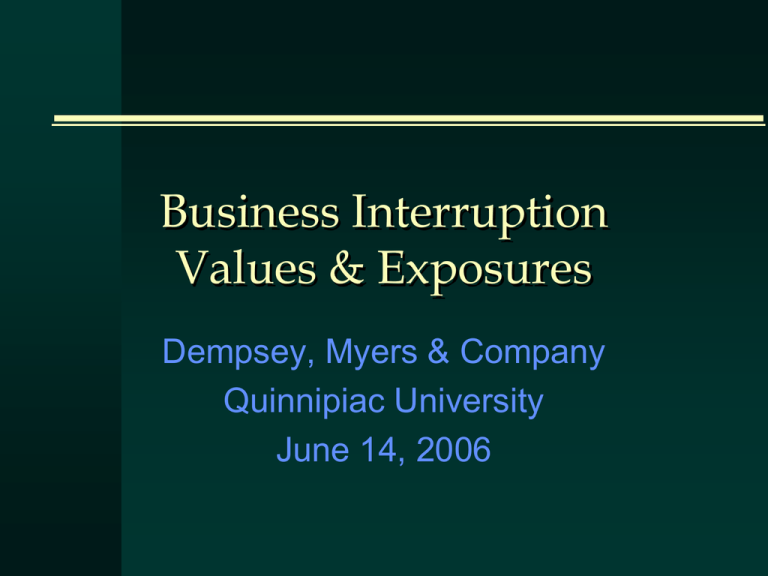
Business Interruption Values & Exposures Dempsey, Myers & Company Quinnipiac University June 14, 2006 Today’s Presentation BI Basics BI Values Explained Values v. Exposures Hypothetical Claims A Business Interruption Primer The purpose of BI coverage is to do for the business what it would have done for itself had there been no loss. Coverage generally triggered by physical damage. Reimburses net profits, continuing expenses and expenses incurred to reduce loss Optional coverage for extra expenses to continue operations Duty to mitigate Coverage Triggered by Direct Damage to Insured Property Underlying Form: ISO/Proprietary/Manuscript Extended Period of Indemnity Research and Development E-Commerce Extra Expense Coverage Triggered by Damage to Other Property Contingent Business Interruption Contingent Extra Expense Interdependent Properties Civil Authorities Ingress/Egress Service Interruption Leasehold Interest Royalties Business Interruption Three Essential Variables: – Time – Revenue – Costs Business Interruption Key Revenue Streams - 2006 ($2.95b) Auxiliary activities 13% Departmental activities 4% Investments/Other 2% State of Michigan 38% Student fees 24% Local and private programs 7% Federal programs 12% Business Interruption Expenditures and Surplus - 2006 G&A expense 6% Fixed/other 4% Surplus 5% Instruction/research 40% Operating expense 18% Scholarships 10% Services 17% Business Interruption Reclassification of Expense Components Fixed Cost 10% Surplus 5% Semi-Variable Cost 21% Variable Cost 64% BI Loss - Total Suspension Projected Actual Loss $1,000,000 $0 $1,000,000 Variable Costs $500,000 $50,000 -$450,000 Other Costs $400,000 $300,000 -$100,000 Net Profit $100,000 -$350,000 $450,000 Sales BI Loss - Partial Suspension Sales Projected Actual Loss $1,000,000 $400,000 $600,000 Variable Costs $500,000 $250,000 -$250,000 Other Costs $400,000 $350,000 -$50,000 Net Profit $100,000 -$200,000 $300,000 Business Interruption Loss Evaluate Nature of Revenue: – Will it abate in the event of loss? State of Michigan appropriations Other government aid Student fees Auxiliary activities Research grants Interest Business Interruption Loss Evaluate Nature of Cost: – Will it abate in the event of loss? Instructional costs (salaries, supplies) Utilities and maintenance Auxiliary expenses Research costs General & Administrative costs Depreciation and interest What are BI Values? A projection of what the business will do during a 12-month period What are BI Values? Annualized estimates of net profit and “continuing” (fixed) expenses May or may not include “ordinary payroll” (direct labor expense) Computed for each insured location where earnings are produced Policy requirement of most insurance markets How are BI Values Used? To determine annual premium To allocate premium to business units To determine Probable Maximum Loss (PML) and Maximum Foreseeable Loss (MFL) yardsticks To determine location limits of liability To determine Average Daily Value (ADV) deductibles BI Value Concerns of the underwriter Location exposures and values – Are high MFL locations properly identified? EQ and windstorm exposures – Are significant interdependencies recognized in the underwriting process? – Are significant CBI exposures disclosed? – Are adequate loss control measures in place to reduce loss exposures? BI Value Concerns of the risk manager Conceptual framework and accuracy – Do business units understand the purpose and importance of accurate BI value reporting? Premium allocation – Are reported values calculated consistently among business units and locations? Process efficiency – Is the right amount of data reported? – Is the collection process rational and efficient? BI Value Concerns shared by risk managers and underwriters Accuracy – Are reported values based on reality? – Are values computed in a manner consistent with industry standards across all insurance markets? – Are reported values suitable for calculating PML’s and MFL’s, and for allocating insurance capacity? – Are reported values a reasonable basis for calculating premiums and determining location limits and deductibles? Hypothetical Claim 1 Dormitory Flood Assumptions Heavy rains flood basement and first floor Dormitory evacuated Students relocated – Hotels and other temporary quarters Two month repair period Ten students quit school, seek refunds Hypothetical Claim 1 Dormitory Flood Assumptions Heavy rains flood basement and first floor Dormitory evacuated Students relocated – Hotels and other temporary quarters Two month repair period Ten students quit school, seek refunds Hypothetical Claim 1 Dormitory Flood Issues Presented Value of extra expense loss – Living expenses – Transportation Value of business interruption loss – Lost room revenue – Lost vending profits Hypothetical Claim 2 Service Interruption - Student Center Assumptions Natural gas curtailment in January No heat or hot water Building closed for one week – Book Store closed – Food service suspended – Meeting rooms closed Hypothetical Claim 2 Service Interruption - Student Center Issues Presented Value of business interruption loss – Lost Book Store Profits – Lost Food Service Profits – Loss Mitigation Value of extra expense loss – Meeting relocation costs Hypothetical Claim 3 Laboratory Fire - R&D Loss Assumptions Biochemical experimentation US Government funded for fiscal 1997 Three-fourths completed at time of fire Entire experiment lost; nine months to replace Grant revenue $1 million; fixed cost $83,000/month One month total suspension to repair fire damage Risk of losing future grants if fail to complete Hypothetical Claim 3 Laboratory Fire - R&D Loss Issues Presented Value of business interruption loss – Total suspension period - 30 days – Remainder of period - 9 months – Lost opportunities Other potential losses – Expediting costs – Extra expenses Q&A Contact Details Sharon Pisko Wolfe, CPA Dempsey, Myers & Company LLP 426 Danbury Road Wilton, CT 06897 203-762-5052 sharonwolfe@dempseymyers.com Karen Henricksen, CPA, CFE Dempsey, Myers & Company LLP 127 East 56th Street, 4th Floor New York, NY 10022 212-319-8717 karenhenricksen@dempseymyers.com
